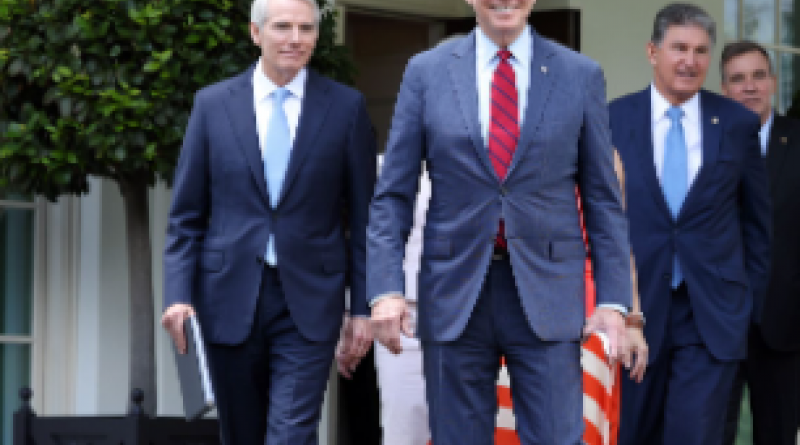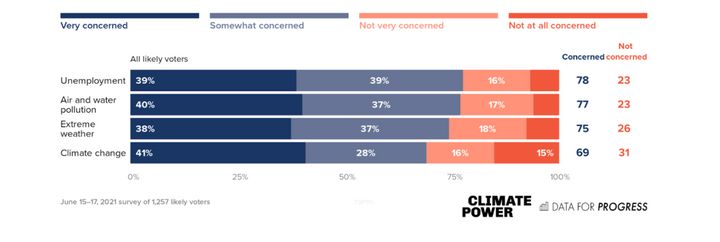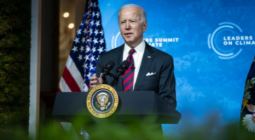Voters Support Biden’s Infrastructure Package, Including Its Climate Provisions

Republicans argue green energy investments don’t belong in an infrastructure package. Polling shows the public disagrees.
A majority of American voters support President Joe Biden’s landmark infrastructure and jobs plan, including the billions of dollars earmarked for combating climate change and boosting renewable energy, according to a new poll.
The survey, from environmental group Climate Power and think tank Data for Progress, comes amid a contentious battle in Washington over infrastructure spending.
Biden’s $2 trillion American Jobs Plan, unveiled in March, called for massive federal investments in green energy and electric vehicles to curb planet-altering emissions. But Republicans have firmly opposed the climate provisions and countered with far more modest proposals, with some arguing that renewable energy and clean water investments don’t fit what they’ve declared to be “real” or “traditional” infrastructure.
The survey found 86% of Democrats, 55% of Independents and 23% of Republicans support the American Jobs Plan as they currently understand it. After surveyors provided more details about the Biden proposal, including its investments in clean energy and funding to clean up abandoned oil wells and mines, overall support climbed from 57% to 65% ― and the largest increase was among Republicans.
“These results crystallize that Americans have had enough talk, they want climate action from Congress. The stakes are too high,” Jason Phelps, a spokesman for Climate Power, told HuffPost via email. “To unleash quality job growth and achieve true environmental justice, Congress must pass the full American Jobs Plan.”
Climate Power has spent $8 million since Biden took office promoting the potential for clean energy infrastructure investment to create millions of good-paying union jobs, The Washington Post reported.

The poll also found that a large majority of voters are concerned about environmental and economic threats in their own communities, from climate change and extreme weather to pollution and unemployment — all of which Biden’s proposal aims to address.

Additionally, 61% of respondents said the federal government should do more to assist state and local governments in building infrastructure that’s more resilient to extreme weather, while 30% said it should do the same amount. Just 8% said it should do less.
The survey, conducted between June 15 and 17, included 1,257 likely voters nationally. Its release comes not only amid ongoing infrastructure negotiations, but as much of the Western U.S. is experiencing brutally high temperatures and extreme drought conditions. Many states are bracing for what is likely to be another devastating wildfire season.
Progressive climate groups have soured on Biden in recent weeks, demanding that the president stand his ground on climate spending and criticizing him for negotiating with Republicans who are seeking to water down the proposal. A number of Democrats have also signaled they won’t vote for an infrastructure bill that lacks climate funding.
“I cannot support a deal that does not have climate at its center,” Sen. Ed Markey (D-Mass.) told MSNBC this week. “No climate, no deal.”
Biden met Thursday morning with a bipartisan group of senators to discuss their latest $1 trillion infrastructure framework and endorsed it afterward. Meanwhile, several Democrats have made clear they would only consider supporting a paired-down package if there is an absolute guarantee that their other priorities, including investments to combat climate change and create green union jobs, are included in a second package advanced through the budget reconciliation process, which only requires 51 votes to make it through the Senate.
“I am not willing to support throwing climate overboard,” Sen. Ron Wyden (D-Ore.) said in a call with reporters Thursday, adding that the two bills must be “directly connected” and move to the floor together.
After endorsing the $1 trillion proposal, Biden told reporters, “If this is the only thing that comes to me, I’m not signing it,” which may reassure progressives.
“I’m not just signing the bipartisan bill and forgetting the rest of it,” he said.
24 June 2021
HUFFPOST




